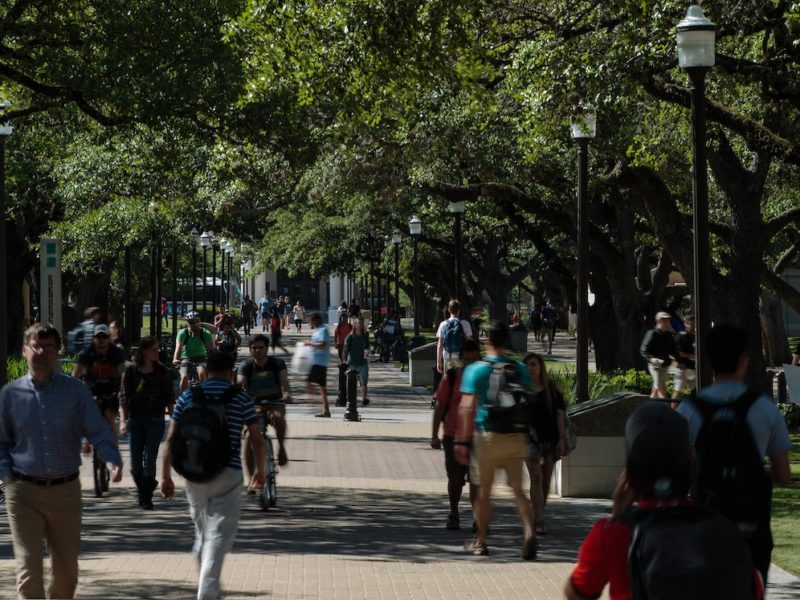Students Train Guide And Service Dogs

For more than 10 years, the Aggie Guide Dogs and Service Dogs (AGS) has been assisting people with disabilities by providing them with a best friend.
This student-run organization trains puppies to become service dogs. It educates, fundraises and promotes awareness of the animals’ interaction with the people that need them.
Federal laws protect the rights of the specially-trained animals and their handlers by allowing them to travel in public places such as buildings and areas where animals are not usually permitted.
AGS serves the disabled community by introducing donated puppies to their role as a service dog, otherwise known as phase one training.
“Puppies are donated to our group from breeders and are evaluated based on a temperament test before they can begin training,” said Katie Gillis, a sophomore animal science major and director of publicity of AGS.
Gillis explained that phase one training can take anywhere from a year to a year and a half. Puppy-raisers are chosen by the group and are responsible for a dog the entire time it is in training.
During this time, puppies are taught basic obedience training, social skills and more specific training to meet the needs of the handlers.
Katie Hiller, a senior construction science major and senior puppy-raiser supervisor for AGS, explained the basic training.
“They go through a general puppy class where they are potty trained and taught general obedience,” Hiller said.
She said her role in AGS is to supervise the training of the four dogs in the program and the puppy raisers responsible for the dogs.
As a group, AGS develops the socialization needed for these animals to become successful service dogs.
“Every week, we get our dogs together and just walk around campus,” Gillis said. “We let them play and it helps them learn how to behave in public.”
Gillis said that once a puppy in the AGS program has met initial training requirements, they are allowed to have jacket privileges.
“At that point, they are allowed to accompany us to class, shopping, the movies. Basically, they go anywhere we go,” Gillis said.
She said this aspect of the training program prepares the dogs for the life they will lead when matched with their future handlers.
In May 2008, two dogs graduated from phase one training. They now serve the disabled community by assisting organizations such as the Texas Hearing and Service Dogs.
Gillis explained that the dogs began training to accommodate the disabled after graduating from phase one.
“Dogs are trained to do a variety of things,” Gillis said. “They are trained to help stabilize a wheelchair when someone gets in and out of it, or turn a light switch on and off for someone who isn’t able to.”
“They can also be trained to stand on two legs and hand a credit card to a cashier by having it placed in their mouth by their handler,” she said.
Kate McClelland, a senior psychology major and the president of AGS, said service dogs bring a sense of newfound independence to those with disabilities.
“They are trained to do a lot of different things,” McClelland said. “Some dogs are trained to push the right buttons to call 911 for their handler and some can even sense a seizure before it happens.”
 AGS serves the disabled community by educating the public about these animals and what they can do.
AGS serves the disabled community by educating the public about these animals and what they can do.
“We try to educate a variety of people about our dogs,” McClelland said. “We have visited local Girl Scout groups, classes on campus and even the local Rotary Club.”
McClelland said she has raised and trained two puppies since she has been involved with AGS.
“Puppy raising required a lot of time and balancing it with school,” McClelland said. “We get puppies when they are eight weeks old, so you have to potty train them and all of that.”
She said the most difficult part of raising puppies was that she eventually had to give them up.
“It was really bittersweet,” McClelland said. “I was really proud that they made it through the program, but sad because they were leaving. I knew that they were leaving for a good cause, though.”
McClelland said that since the organization raises these dogs on their own, they rely heavily on fundraising. AGS generally does one fundraiser a month, she said.
“One of the biggest fundraisers we do is called ‘Doggies-in-Disguise,’” McClelland said.
This year, it will be held on Halloween in Rudder Plaza. McClelland said they will dress the dogs in costumes and will be accepting donations
This article by Sadie Michalk originally appeared in The Battalion.





